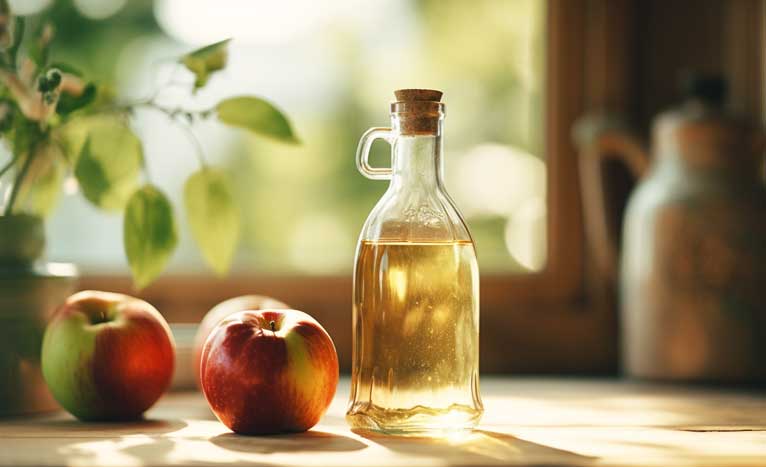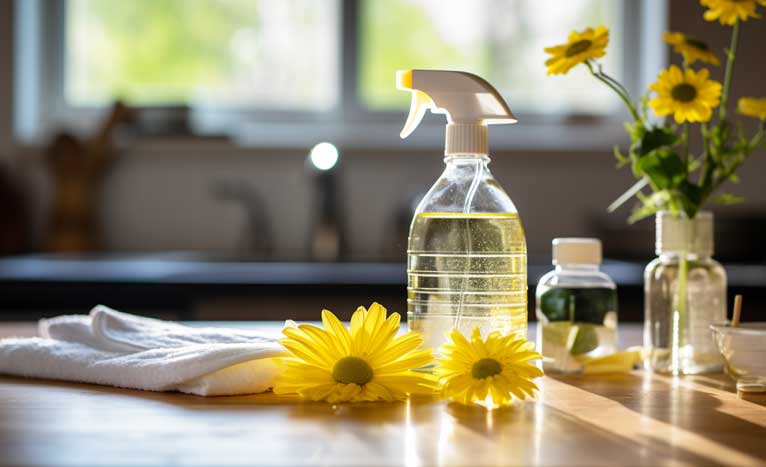Vinegar is a versatile and inexpensive household item that can be used for various cleaning purposes. Its natural acidic properties make it an effective and eco-friendly alternative to many commercial cleaning products. From removing stains and odors to disinfecting surfaces, vinegar can tackle a wide range of cleaning tasks. In this blog, we will explore all the uses of vinegar for cleaning, providing you with valuable tips for harnessing this powerful cleaning agent in your home.
Seriously, do not be fooled by the cleaning aisle at the store—you don’t need that chemical goop to clean your home! I truly believe there are natural alternatives to everything (they have just been forgotten) so even in cleaning, there are better alternatives to toxic chemicals. I worry about how chemical cleaners affect our bodies, and I never realized how much they bothered my system until I stopped using them. I detoxed from chemical cleaners and now whenever I smell them at someone’s home, I get sick and a raging headache. I imagine our bodies have become accustom to the chemicals over the years, and this isn’t normal or natural!
Let’s dive into how you can clean your home chemical-free with vinegar!

1. General Surface Cleaner
One of the most common uses of vinegar for cleaning is as a general surface cleaner. Diluted vinegar is effective in removing dirt, grease, and grime from countertops, tables, and other surfaces. To make a simple surface cleaner, mix equal parts of water and white vinegar in a spray bottle. Spray the solution onto the surface and wipe it clean with a cloth or sponge. Vinegar's acidic nature helps cut through stubborn residue and leaves surfaces clean and shiny.
I love to add essential oils to my cleaner to give it a fresh scent. I love lemon, grapefruit, and peppermint!
2. Glass and Mirror Cleaner
Vinegar is excellent for cleaning glass and mirrors, leaving them streak-free and sparkling. Prepare a glass cleaner by combining equal parts of water and white vinegar in a spray bottle. Spray the solution onto the glass surface and wipe it clean with a lint-free cloth or newspaper. Vinegar's acidity helps dissolve dirt and grime, while its evaporative properties ensure a streak-free finish.
3. Carpet Stain Remover
Vinegar can be used to tackle carpet stains effectively. For most stains, a mixture of vinegar and water can help lift and remove the discoloration. Start by blotting the stain with a clean cloth or paper towel to absorb any excess liquid. Then, mix one part white vinegar with two parts water and apply the solution to the stain. Let it sit for a few minutes, then blot the area with a clean cloth until the stain is lifted. Rinse the area with water and blot dry.
I am happy I have hardwood floors now, so I don’t have to deal with carpet stains anymore. At my old house though, I used this method multiple times for a homemade carpet stain remover and it worked great!
4. Odor Eliminator
Vinegar is known for its odor-absorbing properties, making it an excellent natural deodorizer. To eliminate unwanted odors, place a small bowl of white vinegar in the affected area or use a spray bottle to mist vinegar in the air. The vinegar will help neutralize and eliminate odors, leaving your home smelling fresh. It's particularly effective for removing cooking smells, pet odors, and musty odors.
I know it seems crazy because vinegar smells strong, but the smell dissipates. You can also use a bowl of baking soda to help remove odors if the vinegar doesn’t work.
5. Microwave Cleaner
Cleaning a microwave can be a challenging task and is my least favorite kitchen chore, but vinegar makes it easier. I don’t use the microwave often, but if I do, I clean it with vinegar right after before I put it back into storage.
Fill a microwave-safe bowl with equal parts of water and white vinegar. Place it in the microwave and heat it on high for a few minutes until the mixture boils and creates steam. The steam will help loosen food splatters and stains inside the microwave. Carefully remove the bowl and wipe the interior with a sponge or cloth. The vinegar's acidic properties will dissolve grease and grime, making it easier to clean.
6. Toilet Bowl Cleaner
Vinegar is an effective and natural cleaner for toilet bowls. Sprinkle baking soda around the toilet and pour one to two cups of white vinegar into the toilet bowl and let it sit for a few hours or overnight. Use a toilet brush to scrub the bowl, paying attention to any stubborn stains. The vinegar's acidity helps dissolve mineral deposits and eliminates odors, leaving the toilet bowl clean and fresh. Finish by flushing the toilet.
7. Dishwasher Rinse Aid
Adding vinegar to your dishwasher as a rinse aid can help improve the cleanliness of your dishes. Fill the rinse aid compartment of your dishwasher with white vinegar or place a small cup filled with vinegar on the top rack during the wash cycle. The vinegar will help remove residue and mineral buildup on your dishes, leaving them spotless and shiny.
The best part of using vinegar in your dishwasher is that you don’t have to use toxic dish washer detergents anymore if you don’t want!
There you have it...
Vinegar is a versatile cleaning agent that can be used for a wide range of cleaning tasks. From general surface cleaning to carpet stain removal and odor elimination, vinegar offers a natural and effective solution. Incorporating vinegar into your cleaning routine not only helps maintain a clean and fresh home but also reduces the need for harsh chemicals. Harness the power of vinegar and discover its incredible cleaning capabilities.
I love using vinegar for cleaning my homestead house because I know I won’t have any adverse reactions to it like I would chemical cleaners and neither will my family or pets!
Frequently Asked Questions
Can vinegar be used on all types of surfaces?
Vinegar is safe to use on most surfaces, including countertops, glass, ceramic tiles, and stainless steel. However, it is not recommended for use on porous surfaces like marble or granite, as the acidity can cause damage over time.
Does vinegar disinfect surfaces?
Yes, vinegar has natural disinfecting properties due to its acidity. However, it is not as effective as commercial disinfectants against certain pathogens like E. coli or Salmonella. For thorough disinfection, it is recommended to use a registered disinfectant.
Does vinegar leave behind a strong smell?
Vinegar has a strong smell when initially applied, but it dissipates quickly as it dries. If the smell lingers, you can add a few drops of essential oil, such as lemon or lavender, to the vinegar solution to create a more pleasant scent.
Can vinegar be used to clean hardwood floors?
Vinegar should be used with caution on hardwood floors. It is best to consult the flooring manufacturer's guidelines before using vinegar as a cleaning agent, as some finishes may be sensitive to acidity.
Can vinegar be used as a fabric softener?
Yes, vinegar can be used as a natural fabric softener. Add half a cup of vinegar to the rinse cycle of your washing machine to help remove detergent residue and leave your clothes feeling soft and fresh....

